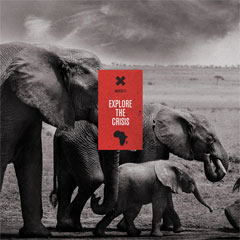
In a joint initiative to end elephant poaching, the Wildlife Conservation Society has teamed up with the Clinton Global Initiative (CGI) to initiate an $80 million commitment action to save Africa's elephants. To advance the goals of this effort, WCS has launched the 96 Elephants campaign. The CGI Commitment to Action brings together NGOs, citizens, and governments to stop the illegal trade of ivory – currently at its highest point since 1989, when the Convention on International Trade of Endangered Species (CITES) decided to ban the sale of ivory throughout the world. The partnership is an innovative one. Hillary Clinton argues that stopping the poaching of elephants is critical to American national security, arguing that the illegal yet highly profitable sale of ivory helps fund terrorist groups such as al-Shabaab. In June, the Enough Project published a report that confirms the role of poaching and the ivory sale in financing the Lord’s Resistance Army (LRA). Though Joseph Kony’s notorious army is currently a shadow of its former self with only a few hundred combatants, ivory helps this indicted war criminal continue to avoid capture.
The initiative allocates $80 million in funding for the three-pronged goal of preventing the killing of elephants, halting the smuggling of ivory, and reeducating global consumers. Most critically, the plan is to hire and train over 3,000 new park rangers at a number of targeted sites across Africa. With better trained staff and cutting-edge technology, the increase in capacity at these 48 national parks across Africa should effectively protect two-thirds of Africa’s entire elephant population. As part of a conservation movement which has sometimes been criticized as anti-African, this initiative has the support of several African countries: Malawi, Cote D’Ivoire, Uganda, Botswana, South Sudan, Kenya, and Gabon.
Public advocacy is a key component of the campaign. At the time of posting, 49,261 people had already signed the petition to call on President Obama to declare a moratorium on ivory sale in the United States. The U.S. is one of the largest markets for ivory in the world, second only to China, where a burgeoning middle class has drastically increased a seemingly-insatiable demand. There are, however, some signs of hope coming out of ivory-hungry Asia. Thailand announced that it will soon begin the process to ban the trade in its legislature. In China, retired basketball star Yao Ming uses his celebrity to raise public awareness around the issue.
But with 35,000 elephants killed on average each year, more work is needed to reverse this trend. The death of 96 elephants each day is more than just a tragedy; it destabilizes countries by funding dangerous armed groups and international criminals, disrupts the order of delicate ecosystems, and brings the already endangered species of African elephants, who now number around 420,000, ever closer to extinction.
See how you can get involved by visiting http://96elephants.org/.
Watch the video here: http://www.youtube.com/watch?v=ze2S2nSm584&feature=youtu.be
Evan Anderson contributed to this blogpost.

